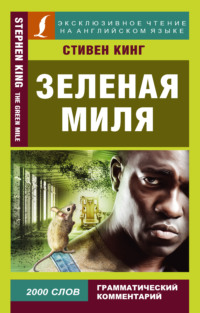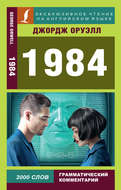Kitabı oku: «Зеленая миля / The Green Mile»
© Stephen King, 1996
© ООО «Издательство АСТ», 2018
Part one
The Two Dead Girls
1
This happened in 1932, when the state penitentiary was still at Cold Mountain1. And the electric chair was there, too, of course.
The inmates made jokes about the chair, the way people always make jokes about things that frighten them but can’t be gotten away from. They called it Old Sparky, or the Big Juicy. They made cracks about the power bill, and how Warden Moores2 would cook his Thanksgiving dinner that fall, with his wife, Melinda, too sick to cook.
But for the ones who actually had to sit down in that chair, the humor went out of the situation in a hurry. I presided over seventy-eight executions during my time at Cold Mountain (that’s one figure I’ve never been confused about; I’ll remember it on my deathbed), and I think that, for most of those men, the truth of what was happening to them finally hit all the way home when their ankles were being clamped to the stout oak of “Old Sparky’ ” legs. The realization came then (you would see it rising in their eyes, a kind of cold dismay) that their own legs had finished their careers. The blood still ran in them, the muscles were still strong, but they were finished, all the same; they were never going to walk another country mile or dance with a girl at a barn-raising. Old Sparky’s clients came to a knowledge of their deaths from the ankles up. There was a black silk bag that went over their heads after they had finished their rambling and mostly disjointed last remarks. It was supposed to be for them, but I always thought: it was really for us, to keep us from seeing the awful tide of dismay in their eyes as they realized they were going to die with their knees bent.
There was no death row at Cold Mountain, only E Block, set apart from the other four and about a quarter their size, brick instead of wood, with a horrible bare metal roof that glared in the summer sun like a delirious eyeball. Six cells inside, three on each side of a wide center aisle, each almost twice as big as the cells in the other four blocks. Singles, too. Great accommodations for a prison (especially in the thirties), but the inmates would have traded for cells in any of the other four. Believe me, they would have traded.
There was never a time during my years as block superintendent when all six cells were occupied at one time—thank God for small favors. Four was the most, mixed black and white (at Cold Mountain, there was no segregation among the walking dead), and that was a little piece of hell. One was a woman, Beverly McCall3. She was black as the ace of spades and as beautiful as the sin you never had nerve enough to commit. She put up with six years of her husband beating her, but wouldn’t put up with his creeping around for a single day. On the evening after she found out he was cheating, she stood waiting for the unfortunate Lester McCall4, known to his pals (and, presumably, to his extremely short-term mistress) as Cutter, at the top of the stairs leading to the apartment over his barber shop. She waited until he got his overcoat half off, then dropped his cheating guts onto his two-tone shoes. Used one of Cutter’s own razors to do it. Two nights before she was due to sit in Old Sparky, she called me to her cell and said she had been visited by her African spirit-father in a dream. He told her to discard her slave-name and to die under her free name, Matuomi. That was her request, that her death warrant should be read under the name of Beverly Matuomi. I guess her spirit-father didn’t give her any first name, or one she could make out, anyhow. I said yes, okay, fine. One thing those years serving as the bull-goose screw taught me was never to refuse the condemned unless I absolutely had to. In the case of Beverly Matuomi, it made no difference anyway. The governor called the next day around three in the afternoon, commuting her sentence to life in the Grassy Valley Penal Facility for Women-all penal and no penis, we used to say back then. I was glad to see Bev’s round ass going left instead of right when she got to the duty desk, let me tell you.
Thirty-five years or so later—had to be at least thirty-five—I saw that name on the obituary page of the paper, under a picture of a skinny-faced black lady with a cloud of white hair and glasses with rhinestones at the corners. It was Beverly. She’d spent the last ten years of her life a free woman, the obituary said, and had rescued the small-town library of Raines Falls pretty much single-handed. She had also taught Sunday school and had been much loved in that little backwater. LIBRARIAN DIES OF HEART FAILURE, the headline said, and below that, in smaller type, almost as an afterthought: Served Over Two Decades in Prison for Murder. Only the eyes, wide and blazing behind the glasses with the rhinestones at the corners, were the same. They were the eyes of a woman who even at seventy-whatever would not hesitate to pluck a safety razor from its blue jar of disinfectant, if the urge seemed pressing. You know murderers, even if they finish up as old lady librarians in dozey little towns. At least you do if you’ve spent as much time minding murderers as I did. There was only one time I ever had a question about the nature of my job. That, I reckon, is why I’m writing this.
The wide corridor up the center of E Block was floored with linoleum the color of tired old limes, and so what was called the Last Mile at other prisons was called the Green Mile at Cold Mountain. It ran, I guess, sixty long paces from south to north, bottom to top. At the bottom was the restraint room. At the top end was a T-junction. A left turn meant life—if you called what went on in the sunbaked exercise yard life, and many did; many lived it for years, with no apparent ill effects. Thieves and arsonists and sex criminals, all talking their talk and walking their walk and making their little deals.
A right turn, though—that was different. First you went into my office (where the carpet was also green, a thing I kept meaning to change and not getting around to), and crossed in front of my desk, which was flanked by the American flag on the left and the state flag on the right. On the far side were two doors. One led into the small W.C. that I and the Block E guards (sometimes even Warden Moores) used; the other opened on a kind of storage shed. This was where you ended up when you walked the Green Mile.
It was a small door—I had to duck my head when I went through, and John Coffey5 actually had to sit and scoot. You came out on a little landing, then went down three cement steps to a board floor. It was a miserable room without heat and with a metal roof, just like the one on the block to which it was an adjunct. It was cold enough in there to see your breath during the winter, and stifling in the summer. At the execution of Elmer Manfred6—in July or August of ‘30, that one was, I believe—we had nine witnesses pass out.
On the left side of the storage shed—again—there was life. Tools (all locked down in frames criss-crossed with chains, as if they were carbine rifles instead of spades and pickaxes), dry goods, sacks of seeds for spring planting in the prison gardens, boxes of toilet paper, pallets cross-loaded with blanks for the prison plate-shop… even bags of lime for marking out the baseball diamond and the football gridiron—the cons played in what was known as The Pasture, and fall afternoons were greatly looked forward to at Cold Mountain.
On the right—once again—death. Old Sparky his ownself, sitting up on a plank platform at the southeast corner of the store room, stout oak legs, broad oak arms that had absorbed the terrorized sweat of scores of men in the last few minutes of their lives, and the metal cap, usually hung jauntily on the back of the chair, like some robot kid’s beanie in a Buck Rogers comic-strip. A cord ran from it and through a gasket-circled hole in the cinderblock wall behind the chair. Off to one side was a galvanized tin bucket. If you looked inside it, you would see a circle of sponge, cut just right to fit the metal cap. Before executions, it was soaked in brine to better conduct the charge of direct-current electricity that ran through the wire, through the sponge, and into the condemned man’s brain.
2
1932 was the year of John Coffey. The details would be in the papers, still there for anyone who cared enough to look them out—someone with more energy than one very old man whittling away the end of his life in a Georgia nursing home. That was a hot fall, I remember that; very hot, indeed. October almost like August, and the warden’s wife, Melinda7, up in the hospital at Indianola for a spell. It was the fall I had the worst urinary infection of my life, not bad enough to put me in the hospital myself, but almost bad enough for me to wish I was dead every time I took a leak. It was the fall of Delacroix8, the little half-bald Frenchman with the mouse, the one that came in the summer and did that cute trick with the spool. Mostly, though, it was the fall that John Coffey came to E Block, sentenced to death for the rape-murder of the Detterick9 twins.
There were four or five guards on the block each shift, but a lot of them were floaters. Dean Stanton10, Harry Terwilliger11, and Brutus Howell12 (the men called him “Brutal,” but it was a joke, he wouldn’t hurt a fly unless he had to, in spite of his size) are all dead now, and so is Percy Wetmore13, who really was brutal… not to mention stupid. Percy had no business on E Block, where an ugly nature was useless and sometimes dangerous, but he was related to the governor by marriage, and so he stayed.
It was Percy Wetmore who ushered Coffey onto the block, with the supposedly traditional cry of “Dead man walking! Dead man walking here!”
It was still as hot as the hinges of hell, October or not. The door to the exercise yard opened, letting in a flood of brilliant light and the biggest man I’ve ever seen, except for some of the basketball fellows they have on the TV down in the “Resource Room” of this home for wayward droolers I’ve finished up in. He wore chains on his arms and across his water-barrel of a chest; he wore legirons on his ankles and shuffled a chain between them that sounded like cascading coins as it ran along the lime—colored corridor between the cells. Percy Wetmore was on one side of him, skinny little Harry Terwilliger was on the other, and they looked like children walking along with a captured bear. Even Brutus Howell looked like a kid next to Coffey, and Brutal was over six feet tall and broad as well, a football tackle who had gone on to play at LSU until he flunked out and came back home to the ridges.
John Coffey was black, like most of the men who came to stay for awhile in E Block before dying in Old Sparky’s lap, and he stood six feet, eight inches tall. He wasn’t all willowy like the TV basketball fellows, though—he was broad in the shoulders and deep through the chest, laced over with muscle in every direction. They’d put him in the biggest denims they could find in Stores, and still the cuffs of the pants rode halfway up on his bunched and scarred calves. The shirt was open to below his chest, and the sleeves stopped somewhere on his forearms. He was holding his cap in one huge hand, which was just as well; perched on his bald mahogany ball of a head, it would have looked like the kind of cap an organgrinder’s monkey wears, only blue instead of red. He looked like he could have snapped the chains that held him as easily as you might snap the ribbons on a Christmas present, but when you looked in his face, you knew he wasn’t going to do anything like that. It wasn’t dull—although that was what Percy thought, it wasn’t long before Percy was calling him the ijit—but lost. He kept looking around as if to make out where he was. Maybe even who he was. My first thought was that he looked like a black Samson… only after Delilah had shaved him smooth as her faithless little hand and taken all the fun out of him.
“Dead man walking!” Percy trumpeted, hauling on that bear of a man’s wristcuff, as if he really believed he could move him if Coffey decided he didn’t want to move anymore on his own. Harry didn’t say anything, but he looked embarrassed. “Dead man—!”
“That’ll be enough of that,” I said. I was in what was going to be Coffey’s cell, sitting on his bunk. I’d known he was coming, of course, was there to welcome him and take charge of him, but had no idea of the man’s pure size until I saw him. Percy gave me a look that said we all knew I was an asshole (except for the big dummy, of course, who only knew how to rape and murder little girls), but he didn’t say anything.
The three of them stopped outside the cell door, which was standing open on its track. I nodded to Harry, who said: “Are you sure you want to be in there with him, boss?” I didn’t often hear Harry Terwilliger sound nervous—he’d been right there by my side during the riots of six or seven years before and had never wavered, even when the rumors that some of them had guns began to circulate—but he sounded nervous then.
“Am I going to have any trouble with you, big boy?” I asked, sitting there on the bunk and trying not to look or sound as miserable as I felt—that urinary infection I mentioned earlier wasn’t as bad as it eventually got, but it was no day at the beach, let me tell you.
Coffey shook his head slowly—once to the left, once to the right, then back to dead center. Once his eyes found me, they never left me.
Harry had a clipboard with Coffey’s forms on it in one hand. “Give it to him,” I said to Harry. “Put it in his hand.”
Harry did. The big mutt took it like a sleepwalker.
“Now bring it to me, big boy,” I said, and Coffey did, his chains jingling and rattling. He had to duck his head just to enter the cell.
I looked up and down mostly to register his height as a fact and not an optical illusion. It was real: six feet, eight inches. His weight was given as two-eighty, but I think that was only an estimate; he had to have been three hundred and twenty, maybe as much as three hundred and fifty pounds. Under the space for scars and identifying marks, one word had been blocked out in the laborious printing of Magnusson, the old trusty in Registration: Numerous.
I looked up. Coffey had shuffled a bit to one side and I could see Harry standing across the corridor in front of Delacroix’s cell—he was our only other prisoner in E Block when Coffey came in. Del was a slight, balding man with the worried face of an accountant who knows his embezzlement will soon be discovered. His tame mouse was sitting on his shoulder.
Percy Wetmore was leaning in the doorway of the cell which had just become John Coffey’s. He had taken his hickory baton out of the custom-made holster he carried it in, and was tapping it against one palm the way a man does when he has a toy he wants to use. And all at once I couldn’t stand to have him there. Maybe it was the unseasonable heat, maybe it was the urinary infection heating up my groin and making the itch of my flannel underwear all but unbearable, maybe it was knowing that the state had sent me a black man next door to an idiot to execute, and Percy clearly wanted to hand-tool him a little first. Probably it was all those things. Whatever it was, I stopped caring about his political connections for a little while.
“Percy.” I said. “They’re moving house over in the infirmary.”
“Bill Dodge14 is in charge of that detail—”
“I know he is,” I said. “Go and help him.”
“That isn’t my job,” Percy said. “This big lugoon is my job.” “Lugoon” was Percy’s joke name for the big ones—a combination of lug and goon. He resented the big ones. He wasn’t skinny, like Harry Terwilliger, but he was short. A banty-rooster sort of guy, the kind that likes to pick fights, especially when the odds are all their way. And vain about his hair. Could hardly keep his hands off it.
“Then your job is done,” I said. “Get over to the infirmary.”
His lower lip pooched out. Bill Dodge and his men were moving boxes and stacks of sheets, even the beds; the whole infirmary was going to a new frame building over on the west side of the prison. Hot work, heavy lifting. Percy Wetmore wanted no part of either.
“They got all the men they need,” he said.
“Then get over there and straw-boss,” I said, raising my voice. I saw Harry wince and paid no attention. If the governor ordered Warden Moores to fire me for ruffling the wrong set of feathers, who was Hal Moores going to put in my place? Percy? It was a joke. “I really don’t care what you do, Percy, as long as you get out of here for awhile!”
For a moment I thought he was going to stick and there’d be real trouble, with Coffey standing there the whole time like the world’s biggest stopped clock. Then Percy rammed his billy back into its hand-tooled holster—foolish damned vanitorious thing—and went stalking up the corridor. I don’t remember which guard was sitting at the duty desk that day-one of the floaters, I guess—but Percy must not have liked the way he looked, because he growled, “You wipe that smirk off your shitepoke face or I’ll wipe it off for you” as he went by. There was a rattle of keys, a momentary blast of hot sunlight from the exercise yard, and then Percy Wetmore was gone, at least for the time being. Delacroix’s mouse ran back and forth from one of the little Frenchman’s shoulders to the other, his filament whiskers twitching.
“Be still, Mr. Jingles15,” Delacroix said, and the mouse stopped on his left shoulder just as if he had understood. “Just be so still and so quiet.” In Delacroix’s lilting Cajun accent, quiet came out sounding exotic and foreign—kwaht.
“You go lie down, Del,” I said curtly. “Take you a rest. This is none of your business, either!”
He did as I said. He had raped a young girl and killed her, and had then dropped her body behind the apartment house where she lived, doused it with coal-oil, and then set it on fire, hoping in some muddled way to dispose of the evidence of his crime. The fire had spread to the building itself, had engulfed it, and six more people had died, two of them children. It was the only crime he had in him, and now he was just a mild-mannered man with a worried face, a bald pate, and long hair straggling over the back of his shirt-collar. He would sit down with Old Sparky in a little while, and Old Sparky would make an end to him… but whatever it was that had done that awful thing was already gone, and now he lay on his bunk, letting his little companion run squeaking over his hands. In a way, that was the worst; Old Sparky never burned what was inside them, and the drugs they inject them with today don’t put it to sleep. It vacates, jumps to someone else, and leaves us to kill husks that aren’t really alive anyway.
I turned my attention to the giant.
“If I let Harry take those chains off you, are you going to be nice?”
He nodded. It was like his head-shake: down, up, back to center. His strange eyes looked at me. There was a kind of peace in them, but not a kind I was sure I could trust. I crooked a finger to Harry, who came in and unlocked the chains. He showed no fear now, even when he knelt between Coffey’s treetrunk legs to unlock the ankle irons, and that eased me some. It was Percy who had made Harry nervous, and I trusted Harry’s instincts. I trusted the instincts of all my day-to-day E Block men, except for Percy.
Ücretsiz ön izlemeyi tamamladınız.








